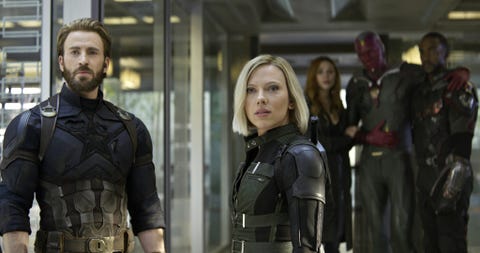There’s a memorable line in The Avengers, when Black Widow tells an imprisoned Loki: “I got red in my ledger, I’d like to wipe it out.” It’s probably the most pertinent statement about who this character, played by Scarlett Johansson, was, is, and is desperately trying to be. Unlike Iron Man or Star-Lord, Natasha Romanoff is a Marvel hero of few, huskily-delivered words, and this remark speaks volumes about the super spy’s heroic narrative—one motivated by atonement for the pervasive ills of her past. But in the decade that Johansson has been a part of the Marvel Cinematic Universe, appearing in no less than seven films, her character has consistently played second, third, or fourth fiddle to leading male heroes, who’ve been afforded far more depth of character and development.
Now, with Black Widow, Johansson’s first solo outing, the origins of Natasha’s moral debts have been put into sharper focus. On the run from former friends and old foes, Nat rediscovers a global conspiracy she thought she’d thwarted years before and must mend broken relationships in order to save the day, clear her ledger, and, at long last, her conscience.
This film is tasked with more than simply giving Johansson her long-overdue top billing; it had to bridge the gap between the person Natasha was at the end of Captain America: Civil War and the hero who would sacrifice her life to save her best friend (and the universe) in Avengers: Endgame. Thus, director Cate Shortland and her crew embarked on a quest to redefine who the Avenger formerly known as Black Widow had always been. “Scarlett really honored the character,” Shortland tells ELLE.com. “She wanted to talk about difficult things, like sexualization. We set out to take back who [Natasha] was as a human being.”
When Natasha Romanoff was first introduced in Iron Man 2, she appeared as her alias, Natalie Rushman, the seemingly unassuming notary “from legal” who Tony Stark (Robert Downey Jr.) wants to hire as his assistant, mainly because she’s hot. “I want one,” he tells Pepper Potts (Gwyneth Paltrow), as though the woman is an inanimate object designed solely for his personal enjoyment. Of course, that’s exactly what Natasha wants him to think, and the playboy billionaire soon realizes you should be careful what you wish for once he is reintroduced to her as Black Widow, in a scene that sees the camera trained on her ass as she saunters towards him and Nick Fury (Samuel L. Jackson) in a diner.
Hypersexualization would be Natasha’s defining characteristic in a film where she is positioned as little more than a two-dimensional action babe, lacking any sort of personality or emotional undercurrent. A woman who is thrown in as a tool of one man to push another man’s plot forward, to serve as a foil to Tony’s and Happy Hogan’s (played by director Jon Favreau) sexist impulses, without ever fully interrogating their attitudes, and, ultimately, look damn sexy while throttling dudes between her legs.
This frequent throwdown technique for female action stars invokes a sexual symbolism. And for a femme fatale archetype like Natasha, it was a fitting calling card. Shortland didn’t want to erase Natasha’s sex appeal—but rather reframe it. “I love shooting beautiful women; I love women’s bodies, I love the way women move,” she explains. “It was about getting [Johansson] to own her sexuality, and it not being for anybody else. I wanted to eroticize that, but I wanted it to be on our terms.”
She continued, “In essence, [Natasha’s] sexuality is dangerous because of the way that we desire her. I wanted to strip that away and say it’s a form of protection. That’s her armor. And if women are wearing that armor, there’s a distrust underneath, because you cannot reveal your true self. It’s a part of her; it doesn’t define her.”
Writer and director Joss Whedon managed to rehabilitate a significant amount of Black Widow’s sexy, robotic operative image in The Avengers. The 2012 film highlighted both the breadth of her spycraft—by wrong-footing two arrogant male villains in brilliantly executed interrogation scenes—as well as her fighting prowess, as she took on threats as big as her superpowered teammates. But the film allowed her to be vulnerable too: She cares about Hawkeye (Jeremy Renner) and saving others while risking her own life, and she wants to make amends. However, as Loki (Tom Hiddleston) points out, her “ledger is dripping, it’s gushing red,” and Natasha rarely goes into detail about the historic crimes she has committed. In fact, a running joke for several films between her and her arrow-shooting BFF centers on their time in Budapest with nary an explanation of what actually went down.
Black Widow co-writer Eric Pearson, who’s been writing for Marvel since 2010 with credits that include Agent Carter and Thor: Ragnarok, says Black Widow’s solo film will finally force the hero to confront her past, explicitly. “With Natasha, there was a little bit of the myopic, ‘Okay, now I’m going to just try and do as many good things as I can to get into heaven,’” he tells ELLE.com. “That’s not really the earnest way of moving forward and progressing yourself. This movie brings her face-to-face with some of the worst decisions that she had to make in trying to right her life.”
Captain America: The Winter Soldier was a touchstone for Pearson and co-writers Jac Schaeffer and Ned Benson, who both wanted to emulate the “grounded” feel of the Russo Brothers’ first Marvel film, while also having the big MCU moments. That story revolved around the spy games of S.H.I.E.L.D. and Hydra, so it made perfect sense for Nat to co-star. Her humor and growing affection for her team was exhibited through nuanced interactions with Nick Fury and Steve Rogers (Chris Evans), and her charged chemistry with the latter allowed for her playful side to shine, proving that a female character can flirt without it needing to be her most defining feature. Viewers will recognize this skill when Natasha shares the screen with O-T Fagbenle’s Rick Mason in the most recent installment.
Natasha and Steve have vastly different entry points into the world of espionage; he volunteered for scientific experimentation, while she was forced into servitude by the Red Room, the top-secret Soviet brainwashing and training program that turns girls into deadly assassins. Their differing journeys on the road to becoming heroes certainly influenced the contrasting ways in which they get the job done and, through moments of introspection, audiences were given a deeper understanding of Nat’s actions, especially when it comes to keeping her cards close to her chest and playing the best hand to survive. “I only pretend like I know everything, Rogers,” Natasha tells Steve, later asserting. “The truth is a matter of circumstances. It’s not all things to all people all the time and neither am I.”
Shortland jumped at the chance to dissect Natasha’s complex psychology. “There is a certain amount of theater in what she’s done,” she says. “We wanted to take that out, comment on it, and have fun with it.” One way that was achieved was through a running gag from fellow widow Yelena (Florence Pugh) about the ridiculousness of her sister’s fighting pose. “I spent 10 years building up this iconic pose with such weight to it,” Johansson said with a laugh during a press conference. “In a second [Florence] ripped it out, took it, tore it, and shredded it up and stomped on it.”
The same could be said for how Black Widow revisits a controversial plot line from Avengers: Age of Ultron, Whedon’s second Marvel offering which undid much of the goodwill that The Avengers and Winter Soldier established for her character. Maybe the shoehorned romance plot with Bruce Banner (Mark Ruffalo) wouldn’t have been so jarring if Natasha wasn’t the sole female hero for several films, but when she says she’s not the “only monster in the team” after revealing she had received a forced hysterectomy upon graduation from the Red Room, the comment went down like a lead balloon.
After Ultron, neither the narrative threads of Natasha’s barren womb or barren romance were tugged upon again, but during the making of Black Widow, Pearson inadvertently forced the conversation. He had written a sexist joke for David Harbour’s character Alexei Shostakov/Red Guardian to say about Nat and Yelena being in a mood because they were on their period. “Scarlett, Florence, and I were like, ‘Are you serious?’ We were so angry with him,” Shortland recalls. Pearson knew the joke was offensive, explaining that that’s the sort of “lame” thing an old-school guy like Alexei would say: “Let’s get him back with his two girls, who’ve just gone through this great deal of effort to get into the situation, and let’s just have him ruin it immediately; that’s what I was thinking.”
Thankfully, after pointed conversations with Shortland and the actors, they were able to provide a rebuttal that would not only show the Russian up as an “oaf” in need of redeeming himself, but also reclaim the sterilization part of the widows’ backstories without dehumanizing them in the process. “Instead of cutting it out, we decided to answer it, and I think that’s the strength of the film,” Shortland says. “We tried to address it with humor.”
That approach was necessary for a film that hoped to talk about control after years of Natasha acting as a tool for varying patriarchal powers. “The idea of women being subjugated, the idea of women’s reproductive power being taken away—we wanted to poke fun at that as women and to say, ‘Okay, you try and take our power, but we’re not going to take this lying down, and we’re going to make fun of it so that we don’t become victims.’”
Rebuilding bridges with old relatives, after Civil War burned down a few with her Avengers family, was also an important theme for Shortland, but she wanted to reunite viewers with Natasha while she was on her own. “She’s in a public toilet and she’s dirty,” Shortland says. “She’s kind of messed up and at the beginning, she says to herself, ‘I don’t need anybody, I’m destined to be alone,’ and so the film sets out to contradict that.”
With each new person who joins the fray, Natasha tries to retreat back into herself and focus on the mission to keep her deeper emotions at bay. But Pearson loved the idea that Yelena, Alexei, and veteran widow Melina (Rachel Weisz) would succeed in breaking through the walls she puts up, while others have failed. “To see this great character that’s been built up as someone who is impenetrable get knocked off balance by a sister, mom, and dad was so much fun,” he says. “We were able to shake her loose and ideally get her to a point where she could accept herself, forgive herself, and move on.”
From Civil War to Avengers: Infinity War and certainly in Endgame, a shift can be felt in the way Black Widow carries herself, and her solo movie laid the groundwork to earn that development. “We saw a little bit more of an opening up for her,” says Pearson. “She was more accepting of others, herself, and she was more emotionally available. This is what made her the person who’s going to save half of the universe and sacrifice herself.”
Black Widow might not be Natasha Romanoff’s final appearance in the sacred timeline of the MCU, but it gave Johansson the chance to say goodbye on her own terms. As she confirmed in a recent interview, “I have no plans to return as Natasha. I feel really satisfied with this film. It feels like a great way to go out for this chapter of my Marvel identity.”
It certainly is. Black Widow reaffirms the best parts of Natasha’s characterization over the last decade, redefined the more two-dimensional, and added a few new threads to reinforce the complex appeal of a beloved Avenger and cement her legacy as an iconic Marvel hero.
See you in a minute.
This content is created and maintained by a third party, and imported onto this page to help users provide their email addresses. You may be able to find more information about this and similar content at piano.io



